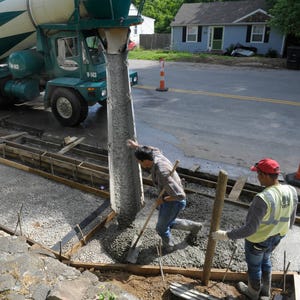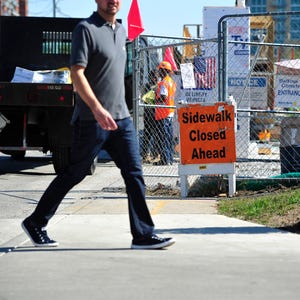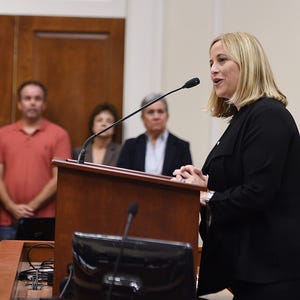I have to say I completely 100% disagree with John Brittle of PARKS reality. The idea is to start. To start building sidewalks in earnest so we can knit them together to form a whole sidewalk network. Nashville knows we have been waiting desperately for walkability. It saddens me thoroughly that someone would call themselves an 'in-fill' specialist and not recognize that walkability is a key piece to the success of this kind of work.
If you would like to let him know that you also disagree - here is his email: johngbrittlejr@gmail.com
Sidewalks will take center stage at the Metro Council in the coming months as multiple bills seek to apply pressure to developers in Nashville to ensure that more are built and existing ones aren’t blocked during construction.
An ordinance proposed by Councilwoman Angie Henderson of Green Hills looks to close what she calls a “loophole” in Metro's code in which developers of new single-family homes and duplexes on many heavily trafficked roads in Davidson County don't have to build sidewalks. They would instead face a new requirement to provide them.
Her proposal also would sharply reduce the number of opportunities in which developers — for residential and nonresidential projects — have the option of paying a fee to the city instead of building sidewalks.
Henderson, a longtime advocate for improving pedestrian accessibility in congested Green Hills, said it’s long past time for Metro to take action to spur more sidewalks, particularly amid Nashville’s steady growth.
“The time was really 50 years ago and then the time was 10 years ago,” Henderson said. “I just wish the city had done this in advance of this building boom, but there’s no time like the present.
“We as a council hear loud and clear that people want sidewalks, and I’m of the mind that it’s a basic civic right to be able to safely walk where you need to go.”
But some in the real estate and development community oppose the measure and have given it a name to express their displeasure — “sidewalks to nowhere.” The new rules, they say, would have the effect of requiring small stretches of sidewalks on some roads that currently have no sidewalks at all.
“There’s just no reason for this at all,” said Nashville real estate agent John Brittle of PARKS Realty, who specializes in residential infill homes, particularly in Green Hills.
He said consumers looking for affordable housing would be most hurt by the sidewalk mandate because costs would be passed down to them.
Brittle said that Metro hasn’t done a good enough job of spending public funds on sidewalks. “And they want to make us start building little chunks of sidewalks all over town?” he said.
“Metro is the government. The department of public works builds sidewalks — or is supposed to be building sidewalks. They know how to do it. It’s ludicrous.”
Brittle said the city should instead allow builders of single-family or two-family homes to pay a fee that would go toward sidewalks. Under current law, only developers of subdivisions are required to either build sidewalks or pay into the fund.
Henderson’s bill is on Thursday’s Metro Planning Commission agenda, but it is scheduled to be deferred until Jan. 12. It would then head for a public hearing at the council and second of three votes Feb. 7.
Combating blocked walks
In a separate legislative push, Councilman Jeremy Elrod, who is chairman of the council’s Public Works Committee, has filed a pair of bills that would try to force developers to keep sidewalks next to their property open during construction.
He’s looking to combat a trend in which developers pay small fees to close sidewalks during construction of their buildings, often leaving pedestrians and bicyclists relying on roadways to get around construction sites.
The nonprofit Walk Bike Nashville this past year sought to raise awareness of the issue by encouraging Nashvillians to identify examples of sidewalk interference on social media with the hashtag #DontBlockMyWalk.
Elrod said the situation has gotten so bad in development-rich downtown that sidewalks on both sides of a road are occasionally blocked. He said now is the time for “big steps” instead of incremental measures.
Elrod has filed an ordinance, set for a first of three votes Tuesday, that would require approval from the council for sidewalk obstructions or excavations that close a public right of way for more than year. The requirement would be added to the sidewalk closure permit process overseen by Metro Public Works.
He’s also introduced a resolution, also scheduled for consideration Tuesday, that would ask Metro Codes and Public Works to produce recommendations for the council’s consideration to address the placement of construction equipment that blocks public streets, sidewalks, alleys and other rights of way.
“Sidewalks are closed too often for too long, and there’s not enough done to keep them open or to shorten the timeframe,” Elrod said. “We’re spending a lot of money on building new sidewalks, and yet the ones that we have in the mostly highly trafficked areas in town we’re closing on a regular basis.”
Earlier this year, the council passed an ordinance led by Councilwoman Burkley Allen that requires developers to create alternate paths during construction when sidewalks are closed. But enforcement has been a problem.
Under Metro’s code, developers can apply for permits to close sidewalks. It costs them $55 for up to five days and $10 for each additional day. The penalty is a flat fee of $165 as well as $30 for each day after the fifth day of closure.
Elrod plans to file future sidewalk legislation as well, including a proposal to raise the closure fees for developers, which he said is so low that they don’t even make line items on their budgets. He said the small fees mean that the public works department lacks resources for an adequate number of sidewalk inspectors to enforce the alternate route requirement.
“There’s no incentives or disincentives for getting folks out of the right of way except for their own bottom line,” Elrod said.
“It’s just totally out of whack and I’m tired of it, and I think a lot of Nashville is tired of it. We want development. We want growth, but we need our sidewalks open.”
Aligning sidewalk efforts
Henderson’s bill, which has more than 10 co-sponsors, would require that sidewalks be provided for multifamily and commercial development on streets in the Urban Services District that are defined as “major and collector” as well as secondary streets that are one-quarter mile away from neighborhood “centers.” These centers are outlined in the NashvilleNext plan, which was adopted by Metro last year.
Her ordinance also would require sidewalks in front of single-family or duplexes on any street in the Urban Zoning Overlay. Sidewalks also would be mandated for single-family or duplexes on major and collector streets in the USD and secondary streets that are a quarter-mile from neighborhood centers. This would extend the sidewalk requirement to many suburban areas in Nashville.
Henderson and Metro planners are in the process of mapping her ordinance to detail precisely which streets would face sidewalk requirements.
Former Mayor Karl Dean’s final capital budget included $25 million for new sidewalk projects, which involve repairs and sidewalk construction. During her first year in office, Mayor Megan Barry has allocated $30 million for sidewalks.
Some council members have grumbled about the rate in which new sidewalks are getting built from these recent infusions. The Nashville Scene reported last week that Metro failed to build any of the sidewalk projects identified for the 2015-16 fiscal year.
According to Billy Fields, interim spokesman of the public works department, Metro has completed or is in the process of building 4.1 miles of new sidewalks since July 2015, totaling $9.3 million.
He said Metro has made repairs along 34.6 miles of sidewalks, totaling $14.3 million.
Fields said every sidewalk project is different and construction time is often dependent on whether Metro has to acquire property.
Barry’s administration is in the process of updating the city’s sidewalks and bikeways master plan for the first time since 2008. Henderson said that’s even more reason why now is the right time for her sidewalks proposal.
Henderson acknowledged that sidewalk “gaps” would be a reality, at least initially, if her ordinance becomes law. But she pointed to NashvilleNext, a plan for the city's future growth that identifies neighborhood centers as places that need better connectivity.
Henderson also referenced ongoing efforts to ensure that future sidewalk projects are prioritized in a way that values things such as access to schools, parks and transit and that future sidewalk money goes toward the priority lists.
“We’re trying to bring things into alignment so that yes, the city is building more sidewalks but also yes, the development community is building new sidewalks,” Henderson said.
Reach Joey Garrison at 615-259-8236 and on Twitter @joeygarrison.






Here is my email to John:
ReplyDeleteHi John,
Saw your quote in The Tennessean and just wanted to let you know, that as a citizen of Green Hills, I 100% disagree with you. The idea is to start. To start building walkability into neighborhoods that are developing or becoming more dense in order to work towards knitting these small pieces together into a cohesive sidewalk grid.
It saddened me and sets back the city of Nashville as a whole when you spoke the way you did. I suspect that you have viewed sidewalk production from one simple viewpoint - your company's economics. Please correct me if I am wrong. I would love to hear your concerns because we need everyone who is invested in Nashville to work towards the common good of making it also safely walkable for all.
You may not be aware but Nashville falls far behind peer cities in terms of sidewalk infrastructure. You also may not know that Nashville is ranked the 15th most dangerous city in regards to pedestrian deaths. These are terrible statistics. When you add in our obesity rates, particularly among children, I am in hopes that you can see beyond simple economics. I would like to point out that house sale prices go up with increased walk scores so sidewalks would actually help realtors longterm. Sidewalks are the kind of project that has great health, social and economic viability. I am in great hopes that you may reconsider.
The reality is two-fold: first, the cost of the proposed sidewalks would be passed directly to the consumer. Second, these projects are primarily single-structure/single-lot, so while the involved property would now have a sidewalk, the adjacent property or properties would not. The description "sidewalks to nowhere" actually seems quite accurate. The expression "too little, too late" comes to mind. What exactly is the benefit of these sporadic sections of unconnected sidewalks to anyone ? Quite simply, there is none.
ReplyDeleteThanks for this lovely post. Now getting Cash Real Estate Deals is made easy with Realestatecake - the best Real estate Platform in the United States.
ReplyDeleteIt is an interesting post. Get Foreclosures in Alabama at the lowest price only at Residential Alabama.
ReplyDeleteThanks for this informative article, Going for new home construction? Find the best Home builders in Georgia at GetNewHomeRebate and book over there for getting amazing rebate back.
ReplyDelete